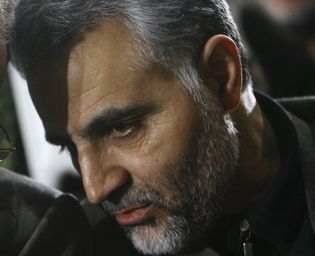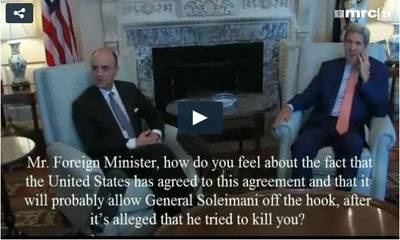Kerry made the remark while speaking at the State Department alongside Saudi Foreign Minister Adel Al-Jubeir. In his previous post as ambassador to the U.S., al-Jubeir was the target of an alleged Qods Force assassination plot involving a planned attack in a Washington restaurant.
A reporter asked the Saudi how he felt about the fact that under the nuclear deal with Iran, Qods Force commander Gen. Maj. Gen. Qassem Soleimani will probably be let “off the hook after it’s alleged that he tried to kill you?”
“First of all, it does not let him off the hook,” Kerry interjected. “He is – no, it’s a different Soleimani who is listed.”
Kerry’s comment alluded to confusion – which other administration officials have sought to clear up – arising from the listing in a lengthy JCPOA annex of two people with similar names – “Ghasem Soleymani” (page 86) and “Qasem Soleimani” (page 95).
One of the two, the director of uranium mining operations at the Saghand Uranium Mine, was designated in a 2008 U.N. Security Council resolution, and will be delisted in “phase one” of the JCPOA implementation, a senior administration official said earlier this week.
The other individual is indeed Gen. Soleimani, commander of the Qods Force, the division of the Islamic Revolutionary Guard Corps (IRGC) responsible for clandestine and terror operations abroad.
He is subjected to both U.N. and U.S. sanctions, in the latter case, among other things for his role in the alleged Washington assassination plot.
The U.S. measures against him are to remain in place, while the U.N. restrictions will be lifted in “phase two” of the JCPOA implementation – in about eight years’ time, according to the senior administration official.
Undersecretary of state for political affairs Wendy Sherman, the lead U.S. negotiator in the talks, confirmed as much at the State Department on Thursday.
“The Qassem Soleimani who comes off [sanctions lists] in the first phase, once in fact we get to it, was head of a uranium mine company,” she said. “It is not Qassem Soleimani of the IRGC.”
Sherman acknowledged that Soleimani of the IRGC is also on the U.N. designations list, and that, too, “would in fact – if everybody complied – come off,” but in “phase two, which is some years away.”
“But he remains on the U.S. list, because of our counterterrorism sanctions, not just because of our nuclear-related sanctions
‘Cutting down to size the U.S. war machine’
Asked whether it was a good thing for Soleimani of the Qods Force “to be taken off at any point, given the allegations” against him, Sherman replied that while he will remain a U.S.-designated individual “for his acts of state-sponsorship of terrorism, as we believe it to be,” the process at the U.N. “is a separate one,” dealing with nuclear-related activities.
Soleimani is accused of directing Shi’ite militias that carried out deadly attacks against U.S. troops in Iraq during the second half of the 2003-2011 war, many of them using especially lethal types of IEDs called explosively formed penetrators.
Gen. Joseph Dunford, President Obama’s nominee to be the next chairman of the Joint Chiefs of Staff, said on Capitol Hill last week that Soleimani was responsible for the deaths of at least 500 U.S. soldiers and Marines in Iraq.
As the last U.S. forces prepared to leave Iraq at the end of 2011 an editorial in Iran’s Kayhan, a hardline publication whose editor is appointed by and serves as an advisor to supreme leader Ayatollah Ali Khamenei stated that “it is undeniable that the Qods Force – and General Qasem Soleymani – have played the most significant role in cutting down to size the U.S.' war machine in the Middle East.”
During a House Homeland Committee subcommittee hearing on Iranian terrorism that October, a former U.S. Army vice chief of staff and a former CIA operative both suggested that Soleimani be killed, prompting official protests from Tehran.
Source http://www.cnsnews.com/news/article/patrick-goodenough/kerry-mix-over-iranian-top-terrorist-soleimani



 RSS Feed
RSS Feed